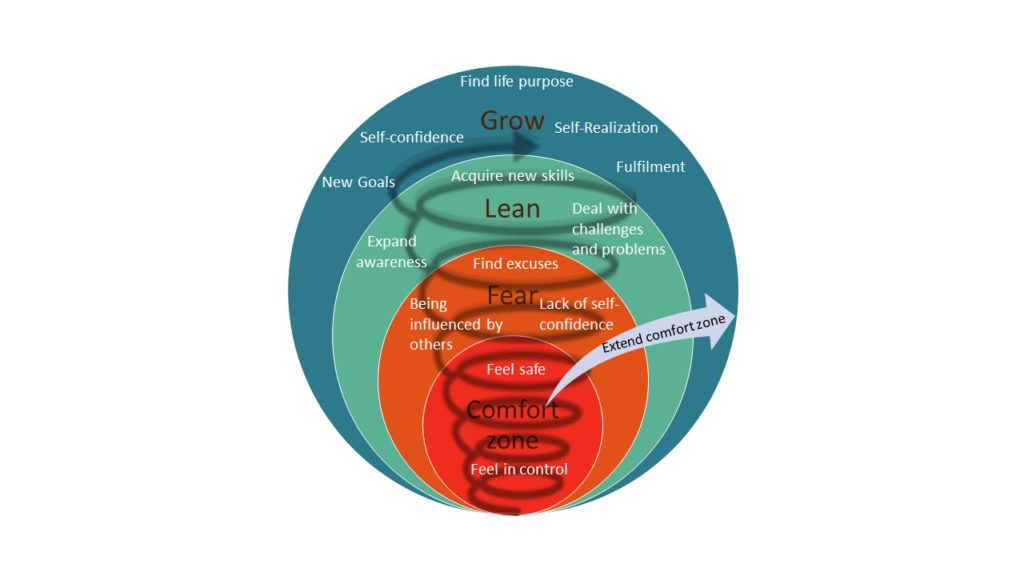Let’s talk about fear. I deal with this topic almost daily with my clients. Fear blocks us, holds us back, makes us wish not to alter the status quo. The status quo is a certainty, it’s true, a protective shell… but for what? If we close ourselves off, we do not close off unpleasant, uncomfortable, unwanted situations or people, but we close ourselves “outside” the reality that inexorably goes on and evolves, with or without us. In the evolutionary history of the human species, it is not the strongest, the most intelligent or cunning beings who have survived, but those who have adapted best to change.
Is change scary? There is always a moment of hesitation before changing and embarking on new businesses, new experiences, new relationships, new challenges.
In general, change, like everything new, causes us to stop for a moment to reflect and evaluate, sometimes only at a glance, the strengths and resources we have at our disposal to face the unknown or do something we have never done before.
We still can’t be sure exactly how we will behave, but our intuition knows how to give us feedback. Is it feedback from the gut, the heart, the head? It depends upon how we are used to orient ourselves and upon our nature.
But sometimes things get complicated. The leap into the unknown seems too big for us, the required changes seem too numerous and we feel as if the ground has fallen from underneath our feet, as if all the certainties that had supported us up to that moment, with their guaranteed margins of tranquility and safety, suddenly collapsed.
How willing are we to lose our old points of reference and revise everything? How long do we have to do it? What guarantees do we have of success? Anxiety and stress rise and as a result, the ability to evaluate what previously seemed immediate, spontaneous, disappears. Our vision narrows and shortens, and, unable to see in the long term, strange and uncomfortable feelings of uncertainty and fear begin to creep inside us.
It is said that fear is a bad counsellor. Fear sometimes makes us run away, and at other times completely immobilise us.
In reality, fear is a natural defence and self-preservation system, it is an emotional system that is triggered by the perception of danger. Thanks to this mechanism we can save ourselves.
Studies on the amygdala, a structure located in the internal part of the medial temporal lobe of the brain, have shown that it is not only responsible for managing emotions and fear, but also for recognising danger. Thanks to this mechanism, the body perceives the danger even before the conscious brain and therefore, even before we begin to think rationally about how to behave, the body already has its own response, its own chemistry. It is a legacy of defence that originates from our instinctive, animal dimension which has its own legitimate and healthy reason to exist.
During this Covid-19 pandemic, we find ourselves, both personally and professionally, pushed towards unexpected changes that take us out of our comfort zone, forcing us to deal with our fears, insecurities and uncertainties.
A company’s way of working, its schedules, structures, tools, communications, priorities have all suddenly changed and are in constant flux. Furthermore, if we are anxious and under stress we could perceive hypothetical or imaginary dangers as real, with consequent stimulation of the amygdala which will release negative emotions such as fear, influencing all that follows.
Therefore, instead of being immobilised by fear, it would be more useful to look at what is causing it, to ask ourselves what the danger is, to objectively see its nature and to verify whether it is real, hypothetical or just imaginary.
We must also have the courage to look deeply into ourselves and find out whether we have the resources to face this unknown and, if we don’t, ask how and where we could get them, who could help us, and systematically sift through the various options available.

By doing so, we depart from the realm of fear and arrive in that of learning. There we expand our awareness, discovering ourselves and our untapped potential. Isn’t it true that, in times of crises, we often find ourselves facing an unexpected event with unexpected resources that we didn’t even know we had? From there comes a renewed sense of safety, resilience and the desire to acquire new tools to expand our Comfort Zone and grow.
The coach’s task is to become an instrument to support this type of process in all its phases, creating an exclusive and protected space in which the coachee can explore options and simulate the potential results without the real dangers that can be encountered in reality.
This way we can evaluate ourselves and our resources in complete security. By increasing awareness, we enhance our personal growth but also that of our company. By acquiring a “cleaner” vision of reality, no longer polluted by our filters, our fears and our insecurities, we will be able to peacefully face any kind of challenge or decision.
Thus, we ourselves will be active architects of a change that we will no longer perceive as imposed by circumstances or as the loss of old familiar references and well-known certainties, but rather as an opportunity for expansion and growth.

